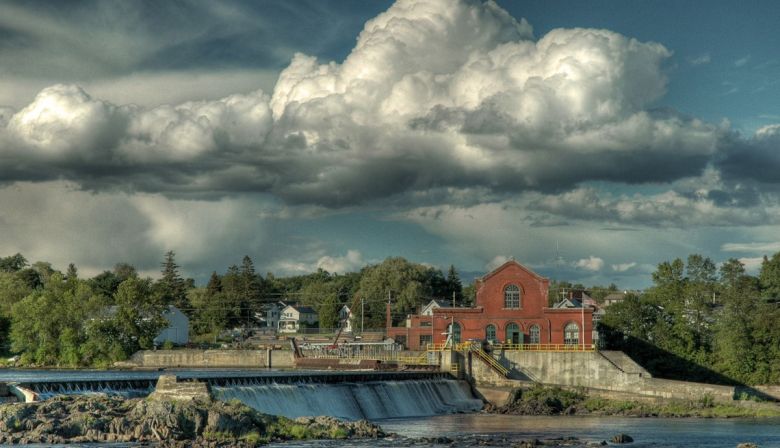
Subscribe & stay up-to-date with ASF


The owner of the Milford Dam on Maine’s Penobscot River, Brookfield Renewable Partners (NYSE: BEP; TSX: BEP.UN), is actively breaking federal environmental law by harming endangered Atlantic salmon, according to documents obtained through the state’s Freedom of Access Act.
In the documents, a federal biologist confirms that most Atlantic salmon are not able to migrate upstream past the dam in a timely way, which is in clear violation of standards set under the Endangered Species Act (ESA). Some fish were left stranded for weeks below the dam. The Milford Dam is the first obstruction that salmon and other migratory fish, including shad and river herring, must pass on their journey from the ocean to spawn.
This lack of safe, timely, and effective fish passage at the Milford Dam continues to stall recovery for endangered Atlantic salmon and other fish species in the Penobscot River.
“The importance of a healthy Penobscot River to the Penobscot Indian Nation cannot be overstated. It is a tragedy that the goals of the Penobscot River Restoration Project are not being fulfilled,” said Daniel McCaw, fisheries program manager with the Penobscot Indian Nation. “Since 2014, the Milford project has never met performance standards for endangered Atlantic salmon, and the dam owners have made no effort to fix the problems. To date, the Federal agencies responsible for licensing the dam’s operations allow this to continue without consequence or even a timeline to remedy this critical bottleneck.”
“Passage delays are very harmful to Atlantic salmon,” said John Burrows, Executive Director of U.S. Operations for the Atlantic Salmon Federation. “Such a large proportion of salmon on the Penobscot experiencing these unnatural delays is having a substantial impact on our efforts to recover this great species. These delays directly contribute to mortality and poor spawning success.”
According to a Maine Department of Marine Resources (DMR) analysis obtained through FOAA, 79% of the salmon failed to pass above the dam within 48 hours during the years 2014-2019. The 48-hour standard is a requirement of the Milford Dam’s Federal Energy Regulatory Commission (FERC) license and Brookfield’s Incidental Take Statement under the ESA.
Despite this evidence, Brookfield has not improved conditions at the dam. Conservationists noted that Brookfield’s fish passage failures at Milford are consistent with those at other dams it owns in Maine and elsewhere.
“Maine’s Department of Environmental Protection has found Brookfield in violation of state water quality standards for failing to pass American shad at the Brunswick Dam on the Androscoggin River, and Brookfield’s record of shad and salmon passage at the Lockwood Dam on the Kennebec is dismal,” said Nick Bennett, Staff Scientist at the Natural Resources Council of Maine. “Shad passage is also terrible at Brookfield’s Holtwood Dam on the Susquehanna River.”
The Penobscot River was the site of one of the most innovative river restoration projects in the world. A unique collaboration of a Tribe, conservation groups, and state and federal agencies resulted in removal of the Veazie and Great Works Dams, decommissioning and bypassing of the Howland Dam, and fish passage improvements at the Milford Dam. Despite progress achieved, Brookfield’s failures at the Milford Dam fish lift are endangering Atlantic salmon and preventing the Penobscot River Restoration Project from realizing its full potential.
“The Kennebec and Penobscot are the two largest rivers in the United States with populations of endangered Atlantic salmon,” said Landis Hudson, Maine Rivers Executive Director. “Both populations are critically endangered, and Brookfield’s dams are violating the ESA on both rivers. This cannot be allowed to continue.”
Sean Mahoney, executive vice president at Conservation Law Foundation, noted that legal action is under consideration.
“We have sued Brookfield over its ESA violations on the Kennebec,” Mahoney said. “In light of Brookfield’s disregard for the ESA on the Penobscot as well, we need to consider all available options to ensure it meets its legal obligations. And that holds true for the federal agencies – FERC and NOAA Fisheries – responsible for enforcing Brookfield’s hydropower license and compliance with the Act.”
Stephen Brooke is a volunteer with Trout Unlimited, which was a founding partner of the historic partnership that helped restore sea-run fish on the Penobscot.
“When we joined that agreement two decades ago, we never imagined that a company would purchase the Milford Dam and ignore its responsibility to pass fish in compliance with the terms in its federal license,” Brooke said. “After this history, no one should ever believe Brookfield when the company claims that it will pass fish at dams it owns, especially given the lack of enforcement by NOAA Fisheries and FERC.”
Links to Local New Coverage:
Portland Press Herald: https://www.pressherald.com/20…
Bangor Daily News: https://www.bangordailynews.co…